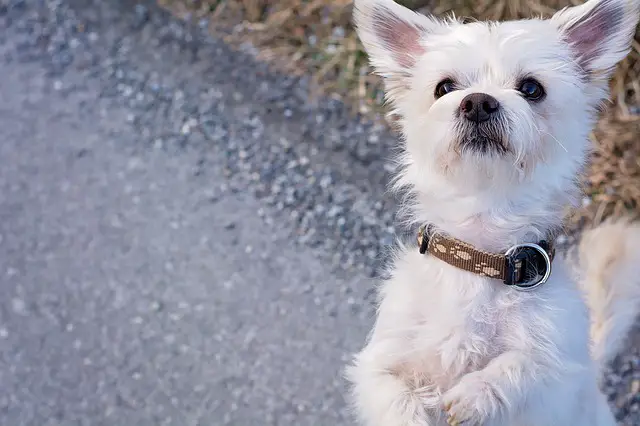Maltese Vomiting – Tips and Advice
There are a variety of reasons Maltese dogs can be vomiting from the mundane to potentially fatal health concerns. The first thing to remember is that it is not uncommon for a dog to occasionally vomit. Sudden vomiting that is continuous or any vomiting which contains bile and blood means you should your dog immediately to the vet. This article aims to guide you to the most common causes of vomiting with a checklist that can help you work out if you need to see a vet. If you are unsure or concerned about your Maltese dog then you should take them immediately to the vet. Reading something on the internet is never a substitute for a proper examination by a vet.
Is Vomiting Normal for a Maltese Dog?
Maltese dogs and Maltese puppies will occasionally vomit. It is not uncommon for a Maltese puppy to vomit. Maltese puppies are known to vomit if they eat too quickly and run around. Older Maltese dogs may eat grass in order to expel some contents from their stomach. It could be that your Maltese dog just doesn’t feel like the food in their stomach feels right and want to get it out. There are a variety of reasons why your Maltese may want to vomit and if they do this on the odd occasion and then continue on like nothing has happened then they are likely to be OK
When do I need to Worry about my Maltese Dog Vomiting?
There are a number of factors that can point to a Maltese dog vomiting as something which is not normal. These symptoms can be immediate and sudden or could be a build up over time. Review the list for concerning symptoms which can accompany vomiting in a Maltese:
- Vomiting which is continuous. If your dog keeps trying to vomit more than once in a short time and nothing is coming up then there is likely a problem which requires your vet to inspect your Maltese dog. They could have eaten something foreign and its got stuck. This is more common in younger dogs.
- Chronic vomiting If your Maltese throws up after every meal or several times a day then you should be getting them checked by your Vet. This could be a sign of an underlying health condition that needs to be addressed by your vet.
- A large amount of vomit. If your Maltese is vomiting a large amount of what it has eaten or the vomiting is forceful and it seems to scare your dog then you need to immediately see a vet. This is not normal for a Maltese dog and requires urgent attention. Call your vet now.
- Your Maltese dog has a fever, weight loss or is lethargic. These signs can indicate that your dog is suffering from poisoning or an illness. Some underlying health conditions such as cancers can produce these symptoms along side vomiting You should immediately get an appointment with your vet as soon as possible to assess your Maltese dog.
- Vomiting blood or bile. If your dog is throwing up and there is blood or black bile in their vomit then you should immediately see your vet. This is a very concerning sign and requires immediate vet attention. Call your vet now.
- Vomiting with nothing coming out. If your Maltese dog is trying to vomit and nothing is coming out then it is likely they have ingested something that has got stuck. This is concerning and requires vet attention. Call your Vet now to get an assessment over the phone.
- Vomiting is accompanied by blood in their stool (poo). If you notice your dog also has blood in their stool this requires a checkup with your vet. It is a sign of an underlying health condition or that something has gotten stuck in their stomach. Your vet will need to do a physical examination of your Maltese puppy.
- Vomiting and your dog is constipated. If your dog has not been to a poo and they are vomiting then something is blocking the stomach. This requires vet attention and needs to be done sooner rather than later. Call your vet now and they will assess the situation.
- Vomiting and you know they ate something they should not have eaten. If you know they have eaten something they should not have eaten such as medicine, cleaners, or small objects then immediately take your dog to the vet. They will be able to assess the poisoning and assess if any small objects have gotten stuck. These situations can be life threatening so immediately call your vet and get advice on what to do.
- Vomiting with seizures. Anytime a dog has a seizure you will need to get it assessed by your vet. This could be a sign of poisoning so if it is sudden then call your vet immediately to get advice on what to do.
- Anytime you think something is wrong. All of the symptoms can’t be written down but as the caretaker for your Maltese puppy you will know if they are not well or something is not right. If you even have a thought that something is not right then call your vet and get them to do a checkup. if you think it is more serious take them to the vet immediately. You are the person in the best position to make the assessment on the seriousness of your Maltese dogs condition.
If you feel at any point that your dog is unwell do not rely on advice on the internet and get your vet to do a physical examination of your Maltese puppy.

What are the most common causes of vomiting in a Maltese dog?
There are a lot of reasons why a Maltese dog may be vomiting The most common reasons included:
- Ate something that did not agree with them
- Ate something that shouldn’t be eaten
- Ate too much (bloated)
- Diet Changes
- Poisoning
- Heat Stroke
- Allergic Reaction
- Constipation
- Motion sickness
If your Maltese dog has eaten something that did not agree with their stomach they may want to regurgitate the item. This could be because the food they have eaten doesn’t sit well or because they have ingested something which is not edible. As long as whatever was in their stomach comes back up and out then they will probably be fine and continue on happily with their day. All dogs, just not the Maltese breed, will regurgitate food if they do not feel it is sitting OK in their stomach. Some Maltese dogs will eat grass to help with the regurgitation to ensure that they have something in their stomach that can be vomited back out.
Sometimes Maltese puppies will ingest an item they should not have eaten. This could be anything from small strings, small rocks, bugs, flowers, paper clips, etc. These items are not edible and your Maltese puppy will determine this pretty fast after they have eaten it. They may try and vomit to get the item out of their stomach. This can be concerning if you know they have eaten something they shouldn’t have eaten. If they do throw it up then you should keep an eye on them to confirm they are OK if they become lethargic, continue to want to vomit or seem to have trouble breathing you should consult your vet immediately.
Maltese puppies can be quick eaters who will devour their food without chewing it. This can cause air to be swallowed as well as them over eating. Just like humans who eat too much at Christmas, if a Maltese puppy eats too quickly they will feel bloated and may regurgitate their food to help remove the pressure on their stomach. This vomit will look like a pile of food, and usually happens within 30 minutes of them eating. They can also feel bloated if they immediately run around after eating a meal. The running and suddenly changing of angles in their run may make them feel sick and this can cause them to vomit their food. It is a good idea to never exercise your puppy for at least an hour after they have had a meal.
If you have changed the food you are feeding your Maltese dog it may upset their stomach. A change in diet is often associated with Maltese puppies throwing up their food as they are unsure about it. Try and stick to a similar diet each day so that you know which foods agree with your Maltese puppy and which ones upset their stomach. Some Maltese can have issues with hard kibble, chewy food or soft food. If you have introduced a new food wait a few days before trying anything new. This way you can determine which food is causing the issues for your Maltese dog.
Deliberate poisoning is very uncommon but accidental poisoning can happen because Maltese puppies eat everything on the ground. This can include medications, pills, rubbish and plastics which can cause poisoning in your Maltese. If you suspect your dog has ingested a poison immediately call the vet and take your dog for an inspection. If you vet recommends it (and only if your vet recommends it over the phone) and you have syrup of ipecac you should use it to induce vomiting in your dog to maximize the chance that the poison is regurgitated as quickly as possible. Take your Maltese dog to the vet immediately for an examination to ensure everything is OK Some poisons can be fatal if not pumped from the Maltese dogs stomach.
Excessive heat can induce vomiting in dogs. if you believe your dog is suffering from heat stroke you need to cool them down immediately and get them inspected by a vet. Heat can be deadly if a dog is left in the sun without water and shade. If it important to always have a shady spot for your Maltese dog and several bowls of water just in case they knock over one of the bowls. Use a ceramic bowl or Metallic bowl as plastic bowls can have some health side effects especially if placed in the sun. If you think your dog is suffering heat stroke use cold water to cool them down and then get them to the vet for a thorough inspection.
Allergic reactions can induce vomiting in Maltese dogs. This happens especially if they have eaten something such as food or a flower with which they have an allergy. If you suspect your dog has allergies to a certain food or plant then you should try and avoid allowing them to have access to that item. Your vet can do allergy tests on your Maltese dog if needed to determine what the allergy is. Allergies will normally show up in hair loss and itchiness before vomiting but it is not uncommon for vomiting to be one of the symptoms.
Constipation can point to either a bad diet or that your dog has eaten something they should not have eaten and it has become stuck. Maltese puppies will eat small items and these items can become lodged in the stomach or intestines. If they stop bowel movements then the waste needs to come out somewhere and it usually results in vomiting If you have not noticed you dog release the bowels recently then take them to the vet to get it looked at. This can be fairly serious so call your vet and provide the symptoms so they can make an assessment on how urgent a vet examination is needed.
Travel sickness and motion sickness are quite common in smaller breeds. Maltese can vomit while in the car or in a crate being moved around. This can be relieved by taking a few stops on a long car drive and trying to minimize the motion that your Maltese dog feels. There are medications that your vet can prescribe to reduce motion sickness if your Maltese has a particularly bad case. One of the good things about vomiting due to motion sickness is that its easy to diagnose as it only happens when your travelling.
There are also a number of health issues which can have vomiting as a symptom These health issues are not limited to this list but a starting point includes:
- Viral Infection or Bacterial infection
- Parasites
- Ulcers
- Pancreatitis
- Organ Failures such as liver failure and Kidney failure
- Cancer
- Colitis

Viruses and Illness from bacterial infections can lead to vomiting in some dogs. This can be due to the way the illness is affecting your dog or because the illness upsets the stomach when your dog eats. Illness in dogs causing vomiting will also have symptoms of lethargy, fever or cough. If you think your dog is not well then you should seek out vet attention so that the illness can be diagnosed and medication prescribed.
Parasites such as tape worm can cause vomiting in a Maltese dog. There are numerous parasites which can infect a dog and ensuring that you are using a reputable worming treatment and flea treatment is a good start to protecting your Maltese puppy. But there are other parasites which can infect a dog which might be picked up at dog parks, beaches and from other dogs which can make a dog feel unwell. Most parasites can be dealt with via treatments from your vet. If your dog continues to vomit or has other issues like itchy skin and patchy skin or hair loss than parasites could be the cause and you should consult your vet to do a thorough examination.
Ulcers can occur in Maltese especially if they suffer from separation anxiety. Stress or bacteria can affect the stomach and cause an ulcer to form. Ulcers are not comfortable and you may see your dog not being able to get comfortable as well as avoiding their food. If you suspect an ulcer consult your vet so they can provide the correct medication and treatment.
There are other more serious diseases which have vomiting as a symptom and these include pancreatitis, colitis, organ failure and cancer to name but a few. These situations are more likely in an older dog then a younger dog. These health concerns will also show symptoms such as hair loss, weight gain or loss, irritability and lethargy This diseases do not jut start over night and the symptoms will progress over several months or years. If you notice your dog has other health issues and is vomiting then you should consult your vet for a diagnosis. They are in the best position to do the necessary tests to determine if there are any underlying health conditions.
Maltese Puppies and Vomiting
Maltese puppies which have not had all their immunizations are at an increased risk of contracting a more deadly disease such as parvovirus. They are also more susceptible to parasites and bacteria as their immune system is still being developed. Another major issues with young Maltese puppies is they taste and test everything with their mouths and this can include things they are allergic to or is poisonous. They may also eat objects which are not edible because they are yet to learn that lesson. All of these things can be serious especially for a young Maltese puppy which is already a very small breed. If you have a young Maltese puppy and it is vomiting and you are unsure why then you should contact your vet immediately and get advice. It may be nothing, but vomiting in younger puppies can be very serious so don’t take any chances.
Treating Vomiting in Maltese Dogs
In order to treat vomiting in your Maltese dog your vet will first need to diagnose the cause of the vomiting This could include a lot of questions to you about what your dog has been eating and what other symptoms they may be showing. Your vet may also need to run some more tests such as x rays and blood tests to determine the cause of the vomiting They will also want to perform a physical examination where they feel around your dogs stomach and intestines as well as inspect the throat to confirm there are no blockages or unusual lumps and bumps.
Your vet will use the physical examination and any results they get from other medical tests to determine the most likely cause of the vomiting Initially your vet will likely want to re-hydrate your Maltese dog as vomiting can cause dehydration and electrolyte imbalances. A drip may be inserted into the dog and they may be kept for observation if they are severely dehydrated. If the vet suspects there is something lodged in the dogs stomach which shows up on an x ray surgery may be needed. Other treatments may include medication to fight off illnesses or ant-nausea medication to be used when travelling. Each treatment will be tailored to the specific cause of the vomiting in your Maltese dog.

Regurgitation compared to Vomiting in Maltese Dogs
Maltese dogs like all dog breeds will often regurgitate their food if they feel they need to. This is a very different action to vomiting Vomiting usually involves contractions of the stomach and retching. They will usually seem unwell for a few minutes before vomiting as they have nausea. Regurgitation is a different motion where the dog expels undigested food and fluids. In the case of regurgitation there will be undigested food and it will be in a circular shape as per the throat of your Maltese puppy.
If you see your dog regurgitating often it is still worth getting it checked out by a vet as there shouldn’t be a need for them to regurgitate unless they are eating too much food or eating too quickly.
When should you call your Veterinarian about your Maltese dog Vomiting?
If you notice your dog vomit once and it doesn’t seem to affect your dog then you do not need to call your dog but there are a few symptoms or signs that you should immediately call your vet for advice. These symptoms and situations include:
- Your dog has eaten something poisonous
- Your dog has eaten something which is not edible
- Your dog is having trouble breathing
- Your dog is vomiting a lot and continuously
- Your dog has blood in their stool or vomit
- Your dog is lethargic
- Your dog has trouble standing up
- Your dog appears uncomfortable when trying to sit or lie down
- Your dog has been in extreme heat
- Your dog has been vomiting after meals for several days
- Your dog has pale gums
- Your dog has a fever
- Most importantly if you feel there is something wrong with your dog as you know your dog best
It is always better to play it safe and call the vet if you are concerned about your Maltese and their vomiting
What you should do if your Maltese Dog is Vomiting and your Concerned?
Obviously the first thing you should do is call the vet and get some advice on whether you need to get a physical examination as soon as possible. A few other things which can help your vet with diagnosis can be:
- Take a video of your dog when they are vomiting with your phone and how they act after they have vomited
- Take a sample of the vomit in a small container so it can be analysed by the vet.
- Take a small sample of stool so it can be analysed by your vet for parasites and blood.
- If you believe it is heat induced vomiting try and cool your dog down with cold water on their paws.
- Look for evidence to see if the dog has been in the garbage or other areas which may contain poisonous substances.
- And just to make sure its clear, call your vet and / or take your Maltese dog to the vet as soon as possible.
If you are unsure always seek assistance from your vet.
Maltese Dog Vomit Color – Yellow, Red, Black, Multicolored
The color of your Maltese dogs vomit can indicate if there are more serious issues. As such we have covered the main colors which may be seen so that you have some idea of the severity:
- Red/Blood: if there is blood in your Maltese dogs vomit you need to call your vet immediately. This is not normal and is a concern.
- Black: Black vomit can indicate an infection and a lot of bile being thrown up. If you see black vomit you should call your vet immediately and seek advice.
- Yellow and frothy: Yellow usually indicates that it has bile in the vomit. If this happens continuously seek out vet advice. If it has only happened once and there are no other concerning signs you may be able to wait and see what happens. If you are unsure call your vet.
- Multi-Colored: Generally means that a lot of food has been vomited This may or may not be OK depending on what the cause is. If there are no other concerning signs you may be able to wait and see what happens. If you are unsure call your vet.
How did we go at answering your Questions on Maltese Dogs Vomiting?
We have done our best to provide the most comprehensive article about Maltese and vomiting If you have a Maltese who vomits hopefully you have been able to get your answers from this article or you have been able to go to your vet and get a diagnosis. If you are unsure about anything with your Maltese dog then your vet is the best person to contact. Have you had a Maltese puppy who vomited? What was the cause? Did you find any treatments which helped? Were there any tips provided fro your vet which haven’t been covered in this article. If so then let us know in the comments. We respond to all comments and will update the article if we get new information and advice for your Maltese dog.
